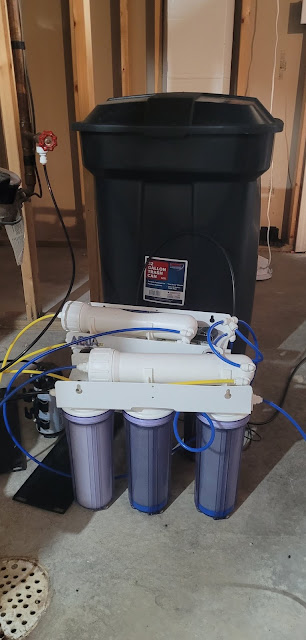One of the most important parts of reef keeping is clean and consistent water parameters. Water is something that has a little bit of a learning curve but gets easier with practice. Here is a link to a good salt mix if you need some ideas.
 To start, I STRONGLY recommend using RODI water. RODI water is filtered water. An example is in the picture to the left. A standard 4 stage filter will normally be sufficient.
To start, I STRONGLY recommend using RODI water. RODI water is filtered water. An example is in the picture to the left. A standard 4 stage filter will normally be sufficient.

This may seem unnecessary to a lot of people. But something to consider... We are responsible for the health of the coral. We need to know exactly what we put into the tank. Otherwise one mistake can destroy everything we work so hard to care for. In order to do that we must strip everything from the water in the form of filtration. We add everything the coral and fish need to survive through the salt mix. It contains the salt and major and minor trace elements.
Once filtered, it is important to verify the water comes to 0 PPM with a TDS (total dissolved solid) meter. This is pictured to the right.
Next we can start adding the salt! Its nice to add a heater and a pump to the bucket to help stir the salt mix. Pour salt in a little at a time and monitor how much the salinity goes up. Salinity is the main component you want to test before adding the new water to your tank. The salt mix should produce the desired parameters once it reaches proper salinity.
The simple break down for reef tank water is:
Calcium: 380-450 PPM
Alkalinity: 7-11 dKH
Salinity: 35 ppt or sg = 1.026
Temperature: 76-82 F or 24.5-27.5 C
-Frogfish Friend


 To start, I STRONGLY recommend using RODI water. RODI water is filtered water. An example is in the picture to the left. A standard 4 stage filter will normally be sufficient.
To start, I STRONGLY recommend using RODI water. RODI water is filtered water. An example is in the picture to the left. A standard 4 stage filter will normally be sufficient.